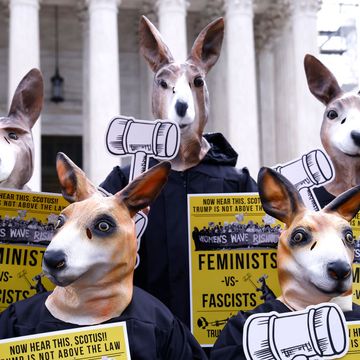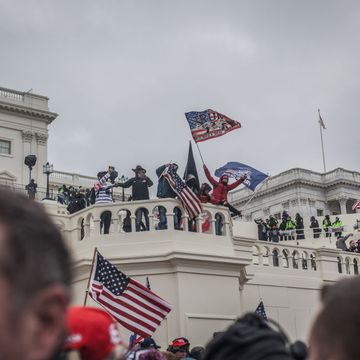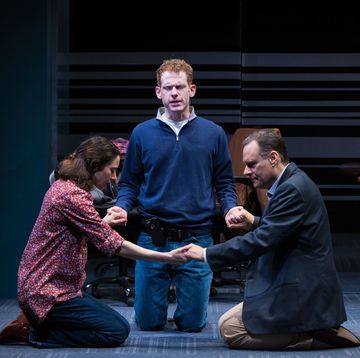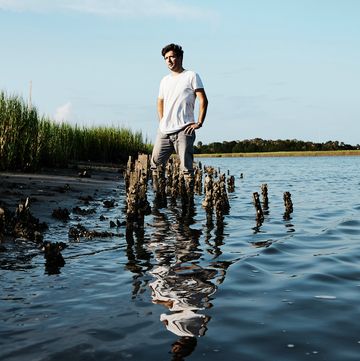WATERTOWN, Ma. — The last of a long day's true absurdities came a little before nine on Friday night. Police cars of every description and size were piling back down Mt. Auburn Street and up towards the Massachusetts Turnpike, whence many of them would depart for dozens of other towns in and around the state. In the distance behind them, cheering arose, and there was a great honking of horns, and as I crossed the bridge over the Charles, a man walked up to me, pinwheels for eyes, and said, "Hey, man. Got any weed?
I stopped and began to laugh. "Are you kidding me?" I asked him. "There are approximately 300,000 cops within four blocks of us right now and you're trying to score?" I laughed again, and he looked sad, and wandered off through Watertown Square in the general direction of the rising applause.
It was a day that began with a guy coming home from work and wandering into a firefight. It was a day that ended with another guy coming home from a day beside the ocean and wandering into another one. It was a day on unearthly quiet along the wooded paths along the river. It was a day of rumors and doubt, and heavy weaponry around the Target and the Best Buy. It was a day of sheltering in place. It was a day in which the essential geography of my life — "Hey, there's the place where I blog every day!" — turned into a place of dark corners and of rustling in the underbrush. And it ended with cheers rising from an old cemetery where buried are some of the casualties from Bunker Hill.
It was a day in which the governor and law enforcement officials called a very solemn press conference to announce that Dzhokhar Tsarnaev, having bafflingly escaped both a high-speed pursuit and a legitimate running gun battle the night before, might very well be in the wind, but that they were lifting the shelter-in-place order and allowing the citizens of Watertown, and Newton, and the adjoining communities to leave their homes again. And then, not 20 minutes later, police cruisers on both sides of the river were executing cop-movie U-turns, and a police helicopter was stationed above a stretch of Mt. Auburn Street, and there were gunshots again, and people soon were gathering in an old cemetery in the dark and the day itself already was filled with ghosts.
Donohue's is an Irish pub on Bigelow Street just up behind the Watertown Mall. (I once played pub trivia there when it was under different management and had a different name, which I can't remember right now.) Late as Thursday night became Friday morning, John Donohue was closing up, and he was watching the television set with increasing alarm. Somebody had shot an MIT police officer to death. Somebody had knocked over a convenience store. After what had happened at the Boston Marathon on Monday, Donohue wondered what the hell was going on around him these days. He decided to go home early. He got in his car and drove up toward Mt. Auburn Street. He turned right. He found himself in the middle of war zone. The Tsarnaev brothers had come home.
"It was a crazy, surreal scene," Donohue said. "I turned the car and I ended up in the middle of this melee. There were shots flying everywhere and I heard two very loud explosions, and then a third one." Donohue tried to go back to his restaurant, but a State Police officer stopped him. "Get the fuck out of here,' the officer explained, "Right fucking now."
Back at the restaurant, Donohue's employees, the kitchen staff and some of the servers, wound up in lockdown as the gunshots echoed a few blocks away. The police kept them inside the restaurant, and most of them weren't allowed to leave until well after four o'clock Friday morning. On Friday, John Donohue went back to work, and he opened the restaurant, but not really. He gave his exhausted help the day off. He served cold drinks and soda to the police who were working the door-to-door search, and who were rousting the house not far away where the bombmaking materials were found. He also found himself serving the media horde that had descended on Mt. Auburn Street in the wake of the firefight the night before.
"Fifteen vehicles just went by, just now" John Donohue said, as the endless, fruitless searching ground on throughout Friday afternoon. "You get used to seeing them now."
The gun battle into which John Donohue wandered exploded the comfortable narrative of these things. We had the event. Then we had the mourning. Then we had "Indomitability Day." Then we had the healing of the interfaith service at which the president gave a fine speech, and the demonstrations of solidarity at the Bruins game. That is the pattern of these things in our public lives, until the next one of these things happens, and then we do it all over again. We did it for Tucson after Columbine. We did it for Aurora after Tucson. We did it for Sandy Hook after Aurora. And, this week, we did it for Boston after Sandy Hook. It's the modern Stations of the Cross, with theme music, and logos, and Wolf Blitzer. We were done. We were healed. And then the Tsarnaev brothers came home. And one of them got away.
Suddenly, healing was very much beside the point. Suddenly, indomitability meant more than shouting brave imprecations on Facebook, or singing the Anthem loudly at a hockey game. Suddenly, indomitability meant staying inside your house, all day, while the men with the body armor and long guns walked your streets, because you might come out of your house and get yourself shot. Our autonomic emotional reflexes were all shorting out. This was an event that happened too soon after the previous event, even though, in most violent places in the world, that's the way these things happen. These are the places without the perennial media Via Dolorosa that we all walk every time another one of these things happen. Our steps were less steady. Our sense of direction was jumbled. We were on a familiar path for a while, and then some son of a bitch moved Golgotha on us, and we didn't know where to go next on our journey to redemption.
Deval Patrick looked exhausted. The firefight had ended hours earlier, and they had made people stay in their houses for a day, and they'd sent police door-to-door in Watertown, and they couldn't find the other suspect, who had somehow managed to escape the firefight on foot, and that was the question everybody was trying to find a way to get him to answer. The governor had had a good week. (He and Boston Police Commissioner Ed Davis had boosted their national standing and, if Davis wants to be the next mayor, he can probably win in a walk.) But now, he was standing behind a bank of microphones outside the parking lot of a Target store, and he looked very much like a man who might be out of answers, because there really wasn't an answer to that one. A 19-year old, probably wounded, had walked away from a gun battle with police in a densely packed residential neighborhood, and now they couldn't find him again, despite all day's trying. How was this possible? Nobody knew.
"In light of the status of the investigation here in Watertown," he said," the stay-indoors request is lifted. The T is open, effective immediately. We're asking the public to remain vigilant. Remember there is still a very, very dangerous individual at large. But we feel comfortable with what we know about the status of the investigation that we can go back to living our lives." That put him in something of a conundrum. The suspect was still at large but now it was safe for you to come out of your house? The press conference ended, and I decided to walk home along the river, which was the only route open, given the lockdown elsewhere in Watertown. I was just passing a boathouse along Charlesbank Road when I saw the first cruiser spin into a Y-turn and then speed off with full sirens and lights. Then another one performed precisely the same maneuver and roared off. Across the river and up the street, I saw a helicopter noisily hovering over what I knew to be upper Mt. Auburn Street in Watertown, not far from the place where I do my blogging every day. Up ahead, the traffic bridge leading into Watertown Square was ablaze with blue lights. I walked past it, found an unsecured pedestrian bridge across the river, and then wended my way through the streets where I once lived until I got the old cemetery at the corner of Mt. Auburn and Common Streets. There were hundreds of people there. There were lights and cameras amid the crumbling tombstones. There were hundreds of cops up the road.
The one thing we should all remember about this is that it was always a police action. There was no need for Patriot Acts, or for warrantless wiretapping, or for "enhanced interrogation techniques," or for anything else out that bag of horrors the previous administration filled so fatly after the attacks of 9/11. The waterboard was left in the closet. This was cops being cops, albeit with some fairly impressive modern-day technology. (I didn't know police helicopters had thermal-imaging capabilities. I will now respect more those signs in New Hampshire that say, "Speed Monitored by Aircraft.") There has been grinding forensic work ever since the bombs went off. There was all that basic shoe-leather detective work yesterday, house after house, block after block. And that's not even to get into the horrific events of Thursday night, which nonetheless did not require a military response. Just cops being cops.
And now there should be a trial. And not just a trial, but the greatest, fairest trial in the history of trials. The defendant should get the best possible legal assistance money can buy. The "public safety exception" to Miranda should be allowed to expire. He should get the best jury we can empanel and, if we have to move the trial to Guam on account of pre-trial publicity, then godspeed. And then he should be tried and, if convicted, in the greatest, fairest trial in history, he should get shipped off forever to federal prison, never to be heard from again. We should ignore all the predictable howling from John McCain, and from his maiden aunt, Lindsey Graham. This guy is accused of being a multiple murderer. He committed his crimes against the people of Suffolk and Middlesex Counties in Massachusetts. These were not acts of war. They were crimes, more garish than most. This was a day for cops, not for grandstanding celebrity politicians who were not here this week.
So, not very long after the press conference, a man named David Henneberry called in a tip to the Watertown P.D. The person had gone out right after the governor had said it was all right to do so, and he'd seen blood on his boat in the backyard. The shrink-wrap on the boat looked like it had been disturbed. He called in the tip. The Watertown Police got the State Police and the FBI on the horn. They all moved up towards 67 Franklin Street, off Mt. Auburn. Cops being cops.
Paul Sutherland was going stir-crazy yesterday afternoon. He was in his house, just the way the governor and the mayor and the chief of police and everyone else said he should be, but he was bouncing off the walls and he needed to get out. So he and his wife drove out of town and up to Plum Island to walk on the beach and look at the sea, and to get out of the armed camp that Watertown had become. They had a fine day of it. They returned to Watertowm, turned into their street, and drove right into a siege. "We took a right turn," he said, "and, all of a sudden, we were right in the middle of it. The gunshots went off — Pow, pow, pow! — and the SWAT teams started to disperse.
"At School and Mt. Auburn, we were driving down Mt. Auburn and a SWAT team come up from behind me, as they went by me, you could hear the rapid gunshots from the front of us. You could see the state police moving forward, and we could see the SWAT team take a left on Franklin Street. We saw the SWAT teams get out of the trucks and I says, 'This is happening, right now!'
"I had my friend, Bill, on the phone, and I'm like, 'Bill, this is going down as we speak.'"
He had been in the cemetery for hours, telling his story to everyone with a camera and everyone with a tape recorder, and everyone with the notebook, and everyone who just stopped for a moment near him. Up beyond, Mt. Auburn Street was a tangle of liquid blue lights, wavering in the air. Darker vehicles moved in and out. Occasionally, loud detonations resounded, which people took for gunshots, but which more likely were gas canisters or, perhaps, flash-bang grenades. It was plain that they wanted this suspect alive, and the sense of that permeated the crowd that was scattered in the dark amid the ancient tombstones. It was not an angry crowd; there were no real calls for anyone's head. It was not a particularly tense one, either. The day's events, from the firefight to the daylong lockdown and search, pretty much had exhausted the capacity of the people of Watertown to be on edge about whatever came next. There was a quivering sense of anticipation, an almost palpable general desire to be on stage for the final act. They had been the principal players in a remarkable drama and they were there to witness a denouement to which they had a perfect right.
The cheering started small. One little knot of folks who'd been marooned by police tape a little ways up Mt. Auburn from the cemetery went off. Then another group across the street. And then it came in waves, as people who had police scanners passed the word first, and then you could hear the news being picked up on the radios of parked cars all around the intersection of Common and Mt. Auburn. The cheering became stronger. It became more general, and it reached a crescendo every time another police car of whatever jurisdiction went by on its way out of Watertown, on its way back home. I walked back toward Watertown Square, toward the place where I blog almost every day, through a geography that had changed on me that morning and that now seemed slowly, in the dark, to be regaining its familiar shape again. And I crossed the dark river, and a guy asked me for weed, and I laughed. I stopped, briefly, to listen for sirens and, hearing none, I figured the day was finally over, and I went along home.

Charles P Pierce is the author of four books, most recently Idiot America, and has been a working journalist since 1976. He lives near Boston and has three children.












